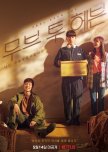Thanks for introducing us to this very special profession
I have huge praise for screenwriter Yoon Ji Ryun for creating a show about trauma cleaners, a profession I didn't know existed. Especially in a culture that is fairly judgemental about people's jobs and superstitious about death, it's doubly important to tell stories about it. Not only does it address trauma cleaners and humanize the dead, but it also tries to portray people with ASD as valuable, capable, and human.
The story is simple and easy to digest. Each character has one main conflict plotline that is punctuated by each encounter with a deceased person as the team cleans up their belongings and learns about their life. The simple treatment is actually why I don't think the show deserves a high overall rating. It is simply too conventional. The conflicts and challenges the characters face and their resulting transformations are too predictable. The dialogue and interactions that show character transformations, though well written and well delivered, are too perfect. The flashbacks of Geu Ru and his father are too smoothly heartwarming. I feel that this show could have taken the highly engaging material and challenged us as viewers. It could have pushed us to rethink what we already know, and asked us to question what it means to live, love, and die, what intelligence is, what family means to us, and what we are willing to sacrifice. Instead, it gives us something to pat ourselves on the back with because most of us already believe what the show is trying to tell us.
Furthermore, one big issue is the show's treatment of Geu Ru. It gets some of the mechanics right about his abilities, but exploits his character to help others learn lessons or change their thinking. I found this to be behind the times in terms of how shows should portray neurodiverse people. We hardly get to know him as a person. We don't understand his inner thoughts at all. If the year was 1980, perhaps this show would have been groundbreaking (in case you didn't know, Rain Man was released in 1988). But alas, it is 2021 and we expect better.
The acting is outstanding, especially Lee Je Hoon as our conflicted underground fighter Sang Gu. I feel he played the sensitive uncle with depth and understanding. I also really enjoyed Hong Seung Hee as Na Mu. She never overplayed her energetic character, despite the fact that her role was basically written as "the responsible nag". Finally, Tang Jun Sang's performance as Geu Ru was understated and he really connected with the other characters even when his character had differing goals.
I will be along for the ride next season, and I sincerely hope this show will grow and challenge us further.
Also, if you are interested in this theme, read The Embalmer, a well crafted manga by Mitsukazu Mihara, which tries to break superstitions and judgement about death and this particular way of preserving the dead.
The story is simple and easy to digest. Each character has one main conflict plotline that is punctuated by each encounter with a deceased person as the team cleans up their belongings and learns about their life. The simple treatment is actually why I don't think the show deserves a high overall rating. It is simply too conventional. The conflicts and challenges the characters face and their resulting transformations are too predictable. The dialogue and interactions that show character transformations, though well written and well delivered, are too perfect. The flashbacks of Geu Ru and his father are too smoothly heartwarming. I feel that this show could have taken the highly engaging material and challenged us as viewers. It could have pushed us to rethink what we already know, and asked us to question what it means to live, love, and die, what intelligence is, what family means to us, and what we are willing to sacrifice. Instead, it gives us something to pat ourselves on the back with because most of us already believe what the show is trying to tell us.
Furthermore, one big issue is the show's treatment of Geu Ru. It gets some of the mechanics right about his abilities, but exploits his character to help others learn lessons or change their thinking. I found this to be behind the times in terms of how shows should portray neurodiverse people. We hardly get to know him as a person. We don't understand his inner thoughts at all. If the year was 1980, perhaps this show would have been groundbreaking (in case you didn't know, Rain Man was released in 1988). But alas, it is 2021 and we expect better.
The acting is outstanding, especially Lee Je Hoon as our conflicted underground fighter Sang Gu. I feel he played the sensitive uncle with depth and understanding. I also really enjoyed Hong Seung Hee as Na Mu. She never overplayed her energetic character, despite the fact that her role was basically written as "the responsible nag". Finally, Tang Jun Sang's performance as Geu Ru was understated and he really connected with the other characters even when his character had differing goals.
I will be along for the ride next season, and I sincerely hope this show will grow and challenge us further.
Also, if you are interested in this theme, read The Embalmer, a well crafted manga by Mitsukazu Mihara, which tries to break superstitions and judgement about death and this particular way of preserving the dead.
Was this review helpful to you?
























